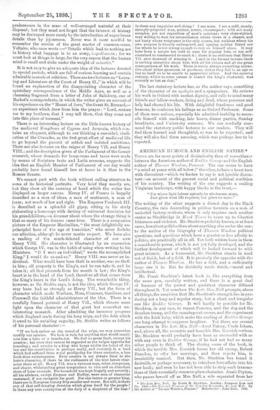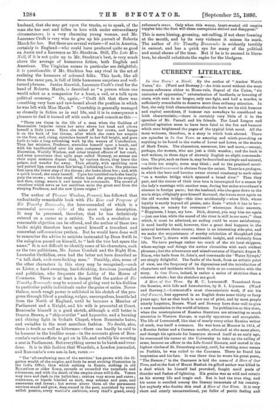AMERICAN HUMOUR AND ENGLISH SATIRE • THERE are far more
points of dissimilarity than of resemblance between the American author of Rudder Grange and the English author of Thomas Wanless, Peasant. The one seems to have "a mind at peace with all below ;" the other, to have a heart torn
with discontent—which we hasten to say is not ignoble discon- tent—on account of the present social and political condition of his country. The writing of the one suggests a smiling Virginian landscape, with happy blacks in the front,—
" For whom light labour spreads its wholesome store, Just gives what life requires, but gives no more."
The writing of the other suggests a dismal day in the Black Country, the rain descending in pitiless torrents on a mob of underfed factory-workers, whom it only requires such another orator as Slackbridge in Hard Times to rouse up to Chartist bitterness and violence. Mr. Stockton probably knows, or at least cares, less about politics than about anything else under the sun ; to the author of the biography of Thomas IVanless political questions, and questions which have a greater or less affinity to politics, are practically all in all. Yet both writers have in them a considerable power, which is not yet fully developed, and the further development of which will be looked forward to with great interest. As a humourist, Mr. Stockton stands in need not of finish, but of a field. It is precisely the opposite with the author of Thonzas TVanless. He has a field, and a sufficiently large one it is. But he decidedly needs finish,—moral and intellectual.
Mr. Frank Stockton's latest book is, like everything from the same pen, carefully written, and there is a great deal of humour of the purest and quaintest character diffused throughout it. Yet somehow The Late Mrs. Null prompts, above all things, the suspicion that Mr. Stockton's strength lies in pro- clueing not a long and regular story, but a short and irregular one like Rudder Grange. It will hardly be possible for Mr. Stockton, in any case, to repeat Pomona, and the dog and the drunken tramp, and the camping-out scenes, and the experiment with the Irish baby, which make the reading of Rudder Grange one long attempt to suppress laughter. Yet there are several characters in The Late Mrs. Null—Aunt Patsey, Uncle Isham, and, above all, the eccentric and irascible Mrs. Keswick—whom Mr. Stockton would probably have been as successful with as with any even in Rudder Grange, if he had not had so many other people to think of. The closing scene of the book, in which the terrible Mrs. Keswick forces her old enemy, Robert Brandon, to offer her marriage, and then rejects him, is irresistibly comical. But then, Mr. Stockton has found it desirable, or perhaps necessary, to introduce love-affairs into his new book ; and even he has not been able to strip such transac- tions of their essentially common-place character. Annie Peyton, who passes herself off as Mrs. Null, a wife separated from her • The Late Mrs. Null. By Frank It. Stockton. London: Sampson Low and CO. MG.—The Rise and Progress of Sir Timothy Buncombe, Km. akd M.P. By the Author or "Thomas Wanless, Peasant." Manchester : John Dale. 1888.
husband, that she may get upon the tracks, so to speak, of the -man she has met and fallen in love with under extraordinary circumstances, is a very charming young woman, and Mr.
Laurence Croft is very wise to give up his pursuit of Roberta March for her. But there are several writers—if not in America, certainly in England—who could have produced quite as good an Annie and a Laurence as Mr. Stockton. Still, The Late Mrs. Null, if it is not quite up to Mr. Stockton's best, is very much
above the average of humorous fiction, both English and American. The Virginian scenes in particular are delightful; it is questionable if Mr. Stockton has any rival in the art of realising the humours of coloured folks. This book, like all from the same pen, is full of little humorous surprises and well- turned phrases. Junius Keswick, Laurence Croft's rival for the hand of Roberta March, is described as "a person whom one would select as a companion for a hunt, a sail, or a talk upon political economy." Or, again,—" Croft felt that there was something very bare and raw-boned about the position in which he was left with Miss March." Courtship is generally managed as clumsily in fiction as in real life, and it is in consequence a pleasure to find it turned off with such a good conceit as this :—
"There are times in the life of a man when the Goddess of Reasonable Impulse raises her arms above her head and allows herself a little yawn. Then she takes off her crown, and bangs it on the back of her throne, after which she rests her sceptre on the floor, and, rising, stretches herself to her full height, and goes forth to take a long refreshing walk by the waters of Unreflection. Then her minister, Prudence, stretches himself upon a beach, and with his handkerchief over his eyes, composes himself for a nap. Discretion, Worldly Wisdom, and other trusted officers of her court, and even sometimes that agile page called Memory, no sooner see their royal mistress depart than, by various doors, they leave the palace, and wander far away. Then silently, with sparkling eyes and parted lips, comes that fair being, Unthinking Love. She puts one foot upon the lower step of the throne; she looks about her ; and, with a quick bound, she seats herself. Upon her tumbled curls she hastily puts the crown ; with her small white hand she grasps the sceptre, and then, rising, waves it and issues her commands. The crowd of emotions which serve as her satellites seize the great seal from the sleeping Prudence, and the new Queen reigns ! "
The author of Thomas Wanless, Peasant, has followed that undoubtedly remarkable book with The Bise and Progress of Sir Timothy Buncombe, the hero-scoundrel of which is a successful nouveau •riche of the most vulgar description. It may be presumed, therefore, that he has definitively
entered on a career as a satirist. To such a resolution no reasonable objection can be offered, and the author of these two books might therefore have spared himself a truculent and somewhat self-conscious preface. But he would have done well to remember the advice to satirists insinuated by Dean Swift in the euloginm passed on himself, to "lash the vice but spare the name." It is not difficult to identify some of his characters, such as the two politicians, Mr. James Conduit and the Right Hon.
Launcelot Orchidion, even had the latter not been described as "a tall, dark, cock-sure-looking man.'' Possibly, also, some of the other characters in this story may be recognised,—such as Lister, a hard-swearing, hard-drinking, ferocious journalist and politician, who frequents the Lobby of the House of
Commons. There is at least a danger that the author of Sir Timothy Buncombe may be accused of giving vent to his dislikes to particular public individuals under the guise of satire. Never- theless, much rough power is exhibited in his sketch of the pro-
gress through life of a pushing, vulgar, unscrupulous, humble lad from the North of England, until he becomes a Member of Parliament and a Knight, and his wife is presented at Court.
Buncombe himself is a good sketch, although a still better is Deacon Brown, a " ship-scuttler " and hypocrite, and a burning and shining light in Goliath Chapel, whom Buncombe hates, and swindles in the most merciless fashion. No doubt, also, there is truth as well as bitterness—there can hardly be said to be humour in the kindlier sense—in the accounts given of Bun- combe's various efforts to get on in life, and notably his securing
a seat in Parliament. But everything seems to be harsh and over- done. It is in this fashion that Weardale, a London journalist,
and Buncombe's own son-in-law, raves
The 'all-swallowing man of the services' has grown with the ill- gotten wealth of the empire, and finds its most striking illustration in the India Office, than which nothing in Russia, nothing in old Byzantium or older Rome, exceeds or exceeded the turpitude and rottenness, and with the death of the empire alone will it die. Voters may rave and dash to the ballot-box ; orators may storm and curse ; statesmen, or bipeds labelled as such, may scheme and pose, and asseverate and invent ; but serene above them all the permanent services stand and grow, deep-rooted in the past, nourished by every selfish passion, every warrior's ambition, every thief's greed, every
reformer's craze. Only when this weary, heart-wasted old empire topples into the dust will these corruptions shrivel and disappear."
This is mere hissing, groaning, cat-calling, if not sheer foaming
at the mouth, and by its very violence it misses its mark. The author of Sir Timothy Buncombe is evidently terribly in earnest, and has a quick eye for many of the political and social shams of the time. But if he is to succeed in litera- ture, he should substitute the rapier for the bludgeon.



































 Previous page
Previous page